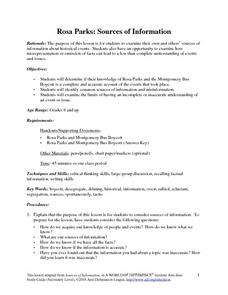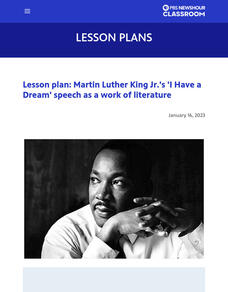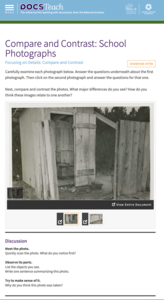Carolina K-12
African Americans and the Vietnam War
No need to look any further. This resource has everything for a solid exploration of the role of African Americans in the Vietnam War. Class members read primary sources, including a Martin Luther King speech, political cartoons of the...
University of North Carolina
Remembering Martin Luther King, Jr.
After reading the article "Kings Dream Everyday," class members conduct a Socratic seminar discussion of Martin Luther King's contributions to the civil rights movement. They then read and respond to a passage from Michael Eric Dyson's...
Anti-Defamation League
Major League Baseball and the Negro Leagues: Correcting an Injustice
It's been a long time coming! In 2020, MLB Commissioner Robert D. Manifred, Jr. stated that "the Negro Leagues would be recognized as official major leagues." Middle schoolers investigate the history of the Negro Leagues and use evidence...
C3 Teachers
African American Voices and Reconstruction: What Does It Take To Secure Equality?
High schoolers research the 13th, 14th, and 15th Amendments, as well as other primary source documents, to determine Reconstruction's impact on the North and South. The 34-page inquiry-based lesson includes a staging question and...
C3 Teachers
Civil Rights: What Made Nonviolent Protest Effective during the Civil Rights Movement?
Sit-ins and boycotts, marches and speeches, songs and demonstrations were hallmarks of nonviolent protest of the civil rights movement. Young scholars research primary and secondary source documents to determine what made nonviolent...
C3 Teachers
African Americans and the Civil War: How Did African Americans Experience the Civil War?
To understand African Americans' involvement in the United States Civil War, high schoolers gather evidence from primary source images, census reports, and documents. As a summative performance task, individuals craft an argument,...
C3 Teachers
Anna - One Woman’s Quest for Freedom: What Did Freedom Mean for Anna?
The 2018 film Anna, One Woman's Quest for Freedom in Early Washington, D.C., offers high schoolers an opportunity to examine the sacrifices one woman endured to gain her freedom from slavery.
Anti-Defamation League
Rosa Parks: Sources of Information
Young scholars show what they know about Rosa Parks and the incident on one of the buses in Montgomery, Alabama. Groups discuss and identify where they receive most of their information. They examine the importance of having a complete...
C3 Teachers
Reparations: Why Are Reparations Controversial?
To understand why the topic of reparations is controversial, young scholars gather background information by reading articles, watching videos, and examining cases where reparations were made. Learners consider the lasting repercussions...
C3 Teachers
Emancipation: Does It Matter Who Freed the Slaves?
Scholars generally agree on the emancipation of enslaved people in the United States. This inquiry-based lesson asks high schoolers to consider more than the claims of who freed the enslaved people but the significance of the issues...
C3 Teachers
Black Genius: How Did Black Genius Help Build American Democracy?
"How did the slavery system undermine the United States' democratic principles?" This question launches a study of how the Preamble to the Declaration of Independence, Article I, Section 2 of the U.S. Constitution, and Article IV,...
Learning for Justice
The Color of Law: Creating Racially Segregated Communities
It is pointed, powerful, and painful! The first of three lessons about laws and practices that support inequality looks at how government policies created and reinforced segregated communities. Young social scientists read excerpts from...
PBS
History of Juneteenth and Why It’s Now a National Holiday
June 19 is now a United States federal holiday. Young historians examine the background of the first Juneteenth celebrations and why on June 15, 2021, Congress finally approved "Juneteenth National Independence Day" as a federal holiday.
PBS
Dr. Martin Luther King Jr.’s ‘I Have a Dream’ Speech as a Work of Literature
To appreciate the oratory of Dr. Martin Luther King Jr.'s "I Have a Dream" speech, scholars examine the rhetorical devices and influences that make the speech so famous. They examine background information, conduct a close reading of the...
PBS
Dr. Martin Luther King Jr.’s ‘I Have a Dream’ Speech as Visual Text
Young historians watch a video of Dr. Martin Luther King Jr. delivering his "I Have a Dream" speech and answer questions that test their knowledge of the event. After discussing the fact sheet, they reread the speech, select a phrase or...
DocsTeach
Compare and Contrast: School Photographs
Separate and very unequal! An interactive presents learners with two images: a photograph of a boys' bathroom at a school in Gloucester County, Virginia, and a second of a girls' bathroom at a different school in the same county. The...
Albert Shanker Institute
Who Was Bayard Rustin?
Who was Bayard Rustin? Pupils analyze a series of primary source documents to learn about this important figure in the civil rights movement. The instructional activity contains a short film to watch along with guiding questions and...
Albert Shanker Institute
The March on Washington Logistics Then and Now
I have a dream ... that all pupils will be able to organize a march of their own after learning about how Bayard Rustin organized the 1963 March on Washington for civil rights. Young reformers work collaboratively examining informational...
Albert Shanker Institute
Strategizing for Freedom
Booker T. Washington, W.E.B. DuBois, Marcus Garvey, and A. Philip Randolph developed different views on how to advance civil rights for African Americans. Class members research these famous figures and their strategies before developing...
Miama-Dade County Public Schools
African Americans and the Civil War
The American Civil War is the theme of this packet of materials prepared for Black History Month. Class members learn about the roles that African Americans played during the Civil War and examine the African-American...
Academy of American Poets
Teach This Poem: "When Fannie Lou Hamer Said" by Mahogany L. Browne
After watching an excerpt from a video of Fannie Lou Hamer's testimony before Congress, pupils do a close reading of Mahogany L. Browne's poem "When Fannie Lou Hamer Said," annotate words and phrases that draw their attention and list...
National Endowment for the Humanities
Harriet Tubman and the Underground Railroad
While many have heard of Harriet Tubman, few are aware of the many ways this remarkable woman was involved in the United States Civil War, the abolitionist movement, and the Underground Railroad. Young historians examine primary source...
National Endowment for the Humanities
African-American Communities in the North Before the Civil War
Middle schoolers may be surprised to learn that before the American Civil War there were more slaves living in New York than there were in Kentucky! Young historians examine maps and census data to gather statistics about...
National Endowment for the Humanities
Toni Morrison's Beloved: For Sixty Million and More
Complex, disturbing, and challenging, Beloved is the focus of a lesson that provides three activities to guide a close reading of Toni Morrison's novel. Readers create chapter titles based on key plot elements or themes,...

























